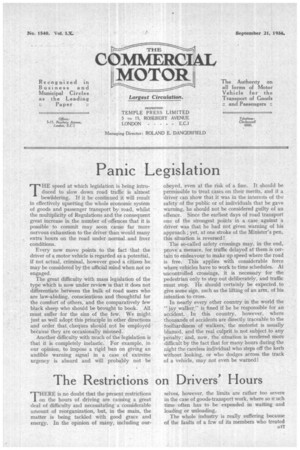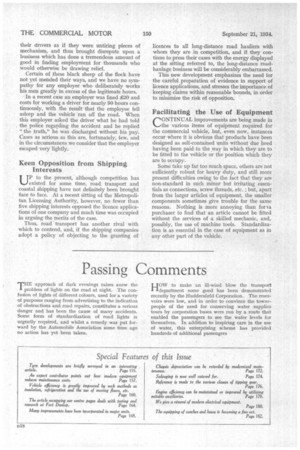The Restrictions on Drivers' Hours
Page 75

Page 76

If you've noticed an error in this article please click here to report it so we can fix it.
rr HERE is no doubt that the present restrictions on the hours of driving are causing a great deal of difficulty and necessitating a considerable amount of reorganization, but, in the main, the matter is being tackled with good grace and energy. In the opinion of many, including our selves, however, the limits are rather too severe in the case of goods-transport work, where so much time often has to be expended in waiting and loading or unloading. The whole industry is really suffering because of the faults of a few of its members who treated their drivers as if they were untiring pieces of mechanism, and thus brought disrepute upon a business which has done a tremendous amount of good in finding employment for thousands who would otherwise be drawing relief. Certain of these black sheep of the flock have not yet mended their ways, and we have no sympathy for any employer who deliberately works his men greatly in excess of the legitimate hours. In a recent case an employer was fined £20 and costs for working a driver for nearly 90 hours continuously, with the result that the employee fell asleep and the vehicle ran off the road. When this employer asked the driver what he had told the police regarding the accident and he replied "the truth," he was discharged without his pay. Cases as serious as this are, fortunately, few, and in the circumstances we consider that the employer escaped very lightly.
Keen Opposition from Shipping Interests
UP to the present, although competition has existed for some time, road transport and coastal shipping have not definitely been brought face to face. At a recent sitting of the Metropolitan Licensing Authority, however, no fewer than five shipping interests opposed the licence applications of one company and much time was occupied in arguing the merits of the case. Thus, road. transport has another rival with which to contend, and, if the shipping companies adopt a policy of objecting to the granting of licences to all long-distance road hauliers with whom they are in competition, and if they continue to press their cases with the energy displayed at the sitting referred to, the long-distance roadhaulage business will be considerably embarrassed. This new development emphasizes the need for the careful preparation of evidence in support of licence applications, and stresses the importance of keeping claims within reasonable bounds, in order to minimize the risk of opposition. "
Facilitating the Use of Equipment
CONTINUAL improvements are being made in 14.—ithe various items of equipment required for the commercial vehicle, but, even now, instances occur where it is obvious that products have been designed as self-contained units without due heed having been paid to the way in which they are to be fitted to the vehicle or the position which they are to occupy. Some take up far too much space, others are not sufficiently robust for heavy duty, and still more present difficulties owing to the fact that they are non-standard in such minor but irritating essentials as connections, screw threads, etc. ; but, apart from the larger articles of equipment, the smaller components sometimes give trouble for the same reasons. Nothing is more annoying than form purchaser to find that an article cannot be fitted without the services of a skilled mechanic, and, possibly, the use of machine tools. Standardization is as essential in the case of equipment as in any other part of the vehicle.








































































































































































